
Blind Willie Johnson was an American gospel blues singer, guitarist and evangelist. His landmark recordings completed between 1927 and 1930—thirty songs in total—display a combination of powerful "chest voice" singing, slide guitar skills, and originality that has influenced generations of musicians. Even though Johnson's records sold well, as a street performer and preacher, he had little wealth in his lifetime. His life was poorly documented, but over time, music historians such as Samuel Charters have uncovered more about Johnson and his five recording sessions.

The Golden Gate Quartet is an American vocal group. It was formed in 1934 and, with changes in membership, remains active.
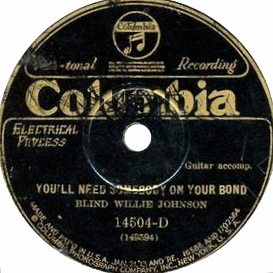
"You'll Need Somebody on Your Bond" is a gospel song that is attributed to both tradition and to gospel blues musician Blind Willie Johnson. Johnson first recorded the song in December 1930, although Delta blues musician Charley Patton recorded a similar "You're Gonna Need Somebody When You Die" in October 1929. Over the years, several other musicians have recorded renditions of the song.

"(The) Soul of a Man" is a gospel blues song recorded by Blind Willie Johnson in 1930. As with most of Johnson's songs, it deals with a spiritual theme within a blues musical framework. Accompanying Johnson is Willie B. Harris, sometimes identified as his first wife, who sang harmony on the refrain:

"It's Nobody's Fault but Mine" or "Nobody's Fault but Mine" is a song first recorded by gospel blues artist Blind Willie Johnson in 1927. It is a solo performance with Johnson singing and playing slide guitar. The song has been interpreted and recorded by numerous musicians in a variety of styles, including Led Zeppelin on their 1976 album Presence.

"Dark Was the Night, Cold Was the Ground" is a gospel blues song written and performed by American musician Blind Willie Johnson and recorded in 1927. The song is primarily an instrumental featuring Johnson's self-taught bottleneck slide guitar and picking style accompanied by his vocalizations of humming and moaning. It has the distinction of being one of 27 samples of music included on the Voyager Golden Record, launched into space in 1977 to represent the diversity of life on Earth. The song has been highly praised and covered by numerous musicians and is featured on the soundtracks of several films.

The Soul of a Man is an album of "twenty haunting spiritual blues songs" recorded in the late 1920s and 1930 by the American gospel blues singer and guitarist Blind Willie Johnson that was released by Charly Records in 2003.

"Bye and Bye We're (or, I'm) Going to See the King" is a Christian song from the African-American musical tradition. It is known by a variety of titles, including "I Wouldn't Mind Dying (If Dying Was All)" and "A Mother's Last Word to Her Daughter". It was recorded seven times before 1930, using the preceding titles.
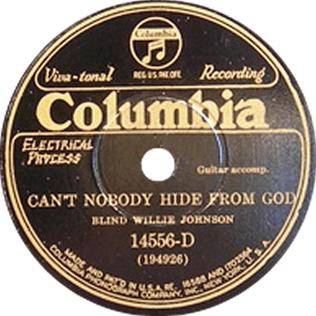
"Can't Nobody Hide from God" is a traditional gospel blues song recorded in 1930 by Blind Willie Johnson with by Willie B. Harris, who is thought to have been his first wife. It was released as a single on Columbia Records, backed with "If It Had Not Been For Jesus"
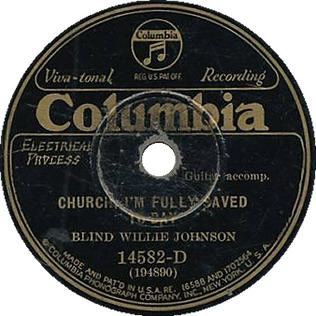
"Church, I'm Fully Saved To-Day" is a gospel blues song recorded by Blind Willie Johnson in 1930, with backing vocals by Willie B. Harris, sometimes identified as his first wife. It was released on Columbia 14582-D, as B-side to "The Soul of a Man". The song is derived from the hymn "Fully Saved Today" by William J. Henry (words) and Clarence E. Hunter (music), published in 1911, and follows a call-and-response format.
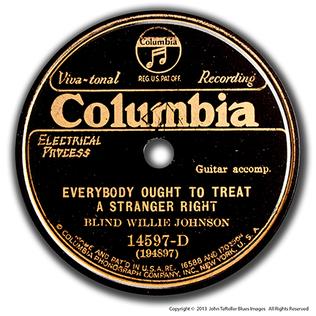
"Everybody Ought to Treat a Stranger Right" is a gospel blues song recorded in 1930 by Blind Willie Johnson with backing vocals by Willie B. Harris, who may have been his first wife. The song was released in 1930 on Columbia 14597 as B-side to "Go with Me to That Land".
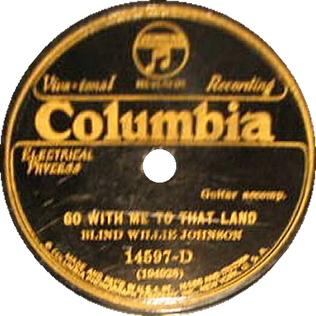
"Go with Me to That Land" or "Come and Go with Me (to That Land)" is a traditional gospel blues song recorded on April 20, 1930 by Blind Willie Johnson with backing vocals by Willie B. Harris, who may have been his first wife. It was released as a single on Columbia 14597-D, backed with "Everybody Ought to Treat a Stranger Right".
"(I Know) His Blood Can Make Me Whole" is a traditional gospel blues song recorded by Blind Willie Johnson in 1927. It was released on his first single, with the flip side "Jesus Make Up My Dying Bed".
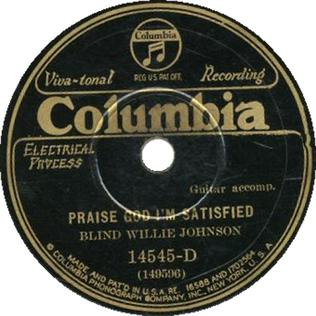
"Praise God I'm Satisfied" is a traditional gospel blues song recorded in 1929 by Blind Willie Johnson and Willie B. Harris (vocals), who is thought to have been his first wife.

"The Rain Don't Fall on Me" is a gospel blues song recorded in 1929 by Blind Willie Johnson and Willie B. Harris (vocals), who is thought to have been his first wife.

"Take Your Stand" is a gospel blues song recorded in 1929 by Blind Willie Johnson on vocals and acoustic guitar and an unidentified female singer.

"If It Had Not Been For Jesus" is an American Christian hymn of unknown authorship. It was included in four hymnals published between 1905 and 1938. The title is taken from the first line of the refrain. An alternative title is the first line of the first verse, namely "I Was a Deep Dyed Sinner". The song is unusual in that it is in triple metre, with three beats to the bar. That suggests that the song may have been composed by an individual whose name has been lost, rather than being ascribable only to "traditional".

The Complete Blind Willie Johnson is a compilation album of all the known recordings by American gospel blues singer-guitarist Blind Willie Johnson. As part of the Roots N' Blues series, it was released jointly by Columbia Records and Legacy Recordings, on April 27, 1993. All of the tracks on the two-compact disc set were originally issued by Columbia on the then-standard two-sided 78 rpm record format.

American Epic: The Best of Blind Willie Johnson is a compilation album released to accompany the award-winning American Epic documentary film series. It collects performances from Blind Willie Johnson's five recording sessions for Columbia Records in Dallas, Atlanta, and New Orleans between 1927 and 1930. The album was released as a 16-track download and a vinyl LP.


















